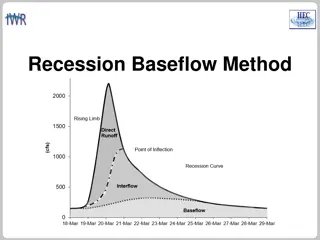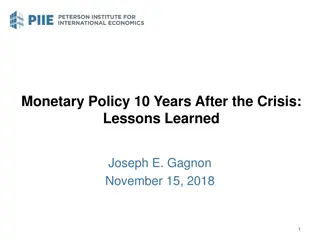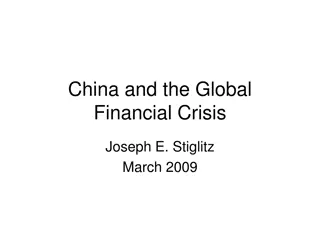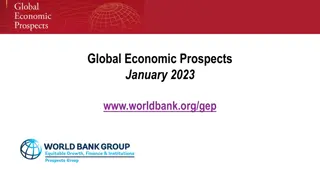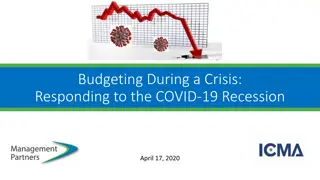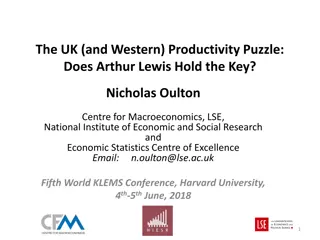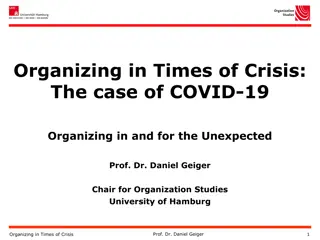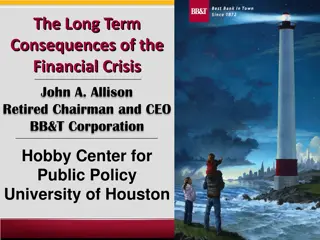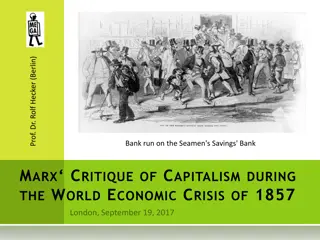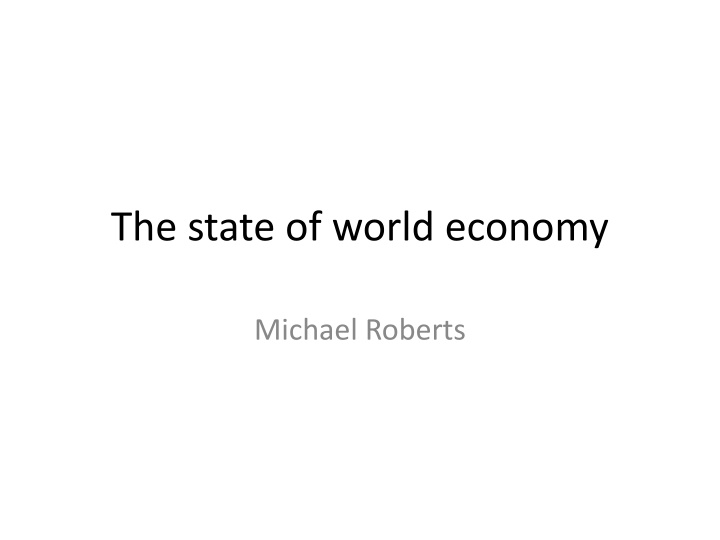
Global Economic Crisis: The Great Recession Analysis
The Great Recession of 2008-2009 marked a significant downturn in the global economy. Explore insights into the causes, impact, and aftermath of this profound economic event, shedding light on official forecasts, trade volume changes, and the collective failure to predict the crisis. Delve into the implications for national incomes and the shortcomings of mainstream economic theories in understanding and preventing such crises.
Download Presentation

Please find below an Image/Link to download the presentation.
The content on the website is provided AS IS for your information and personal use only. It may not be sold, licensed, or shared on other websites without obtaining consent from the author. If you encounter any issues during the download, it is possible that the publisher has removed the file from their server.
You are allowed to download the files provided on this website for personal or commercial use, subject to the condition that they are used lawfully. All files are the property of their respective owners.
The content on the website is provided AS IS for your information and personal use only. It may not be sold, licensed, or shared on other websites without obtaining consent from the author.
E N D
Presentation Transcript
The state of world economy Michael Roberts
The Great Recession The Great Recession of 2008-2009 really was great. It was the longest and deepest in its contraction of output that the global capitalist economy, as represented by the 30 advanced capitalist nations of the OECD, has experienced since the Great Depression of 1929-32. From the peak of the previous boom in real GDP growth from 2007 to the trough of the Great Recession in mid- 2009, the OECD economies contracted by 6% points of GDP. At the trough of the Great Recession, the level of industrial production was 13% below its previous peak, while world trade fell 20% from its previous peak. World stock markets fell an average 50% from the peak in 2007
The Great Recession World trade volume % yoy 15.0 10.0 2.7% a year 5.0 5.7% a year 0.0 -5.0 -10.0 -15.0 2001m01 2001m09 2002m05 2003m01 2003m09 2004m05 2005m01 2005m09 2006m05 2007m01 2007m09 2008m05 2009m01 2009m09 2010m05 2011m01 2011m09 2012m05 2013m01 2013m09 2014m05 2015m01 2015m09 2016m05
Relative loss of national income 0 -5 -5.3 -6.5 -10 -12.4-11.6 -15 -19.4 -18.8-16.6 -20 -25 -24.3 -30 -35 -40 -38.8 -38.7 -45 Gre Ire Spa Por UK Ita US Fra Jap Ger
Official forecasts Before 2007, no official strategist of economic policy forecast any crisis. In October 2008, the great financial maestro Fed chair Alan Greenspan told the US Congress, I am in a state of shocked disbelief. and the reason I was shocked, because I have been going for 40 years or more with very considerable evidence that it was working exceptionally well .
Why did we not see it coming? Your Majesty, the failure to foresee the timing, extent and severity of the crisis and to head it off, while it had many causes, was principally a failure of the collective imagination of many bright people, both in this country and internationally, to understand the risks to the system as a whole. British Academy, The Global Financial Crisis Why Didn t Anybody Notice ?, British Academy Review (July 2009
Mainstream economics The doyen of the neoclassical school, Robert Lucas, confidently claimed back in 2003, that the central problem of depression prevention has been solved . And leading Keynesian, Oliver Blanchard, soon chief economist at the IMF, told us as late as in 2008 that the state of macro is good !
Nobel prize winners! Eugene Fama: We don t know what causes recessions. I m not a macroeconomist so I don t feel bad about that! We ve never known. Debates go on to this day about what caused the Great Depression. Economics is not very good at explaining swings in economic activity. If I could have predicted the crisis, I would have. I don t see it. I d love to know more what causes business cycles.
Keynesian views Lack of effective demand Breakdown of animal spirits Minsky: inherent financial instability Banking deregulation and reckless speculation Financial weapons of mass destruction Warren Buffett
Marxs law of profitability 45% RECOVERY GREAT DEPRESSION 40% NEO-LIBERAL RECOVERY GOLDEN AGE 35% PROFITABILITY CRISIS WAR 30% NEW CRISIS /DEPRESSION RECOVERY LONG DEPRESSION WAR 25% 20% 15% 1869 1875 1881 1887 1893 1899 1905 1911 1917 1923 1929 1935 1941 1947 1953 1959 1965 1971 1977 1983 1989 1995 2001 2007
Recessions and depressions Recessions and depressions - a schematic view Trend growth Trend growth Trend growth Recession 1974-5 typical Double-dip recession 1980-2 typical Depression Trend growth Trend growth Trend growth 1873 2012 1929 2007 1937 1879 1941 WAR! 1880s 1932 2009 Late 19th century depression Great Depression 1930s Long Depression so far
Corporate profits slow Global corporate profits (weighted mean) % yoy 60 50 40 hi-tech boom credit boom 30 20 Long depression 10 0 Great Recession -10 dot.com bust -20 Sep-97 Jun-98 Mar-99 Dec-99 Sep-00 Jun-01 Mar-02 Dec-02 Sep-03 Jun-04 Mar-05 Dec-05 Sep-06 Jun-07 Mar-08 Dec-08 Sep-09 Jun-10 Mar-11 Dec-11 Sep-12 Jun-13 Mar-14 Dec-14 Sep-15 Jun-16 Mar-17 Dec-17
Long Depression We are still in the Long Depression: Cyclical ST swings 2009-2011 (up); 2011-13 (down); 2013-15 (up); 2015-17 (down); 2017-19 (up); 2019-20 (down)?
The short-term cycle Advanced economies: change in real GDP per capita over two year period (%) 4.0 Above trend 3.5 3.0 2.5 Below trend IMF forecast 2.0 1.5 2009-11 2011-13 2013-15 2015-17 2017-19 2019-21



